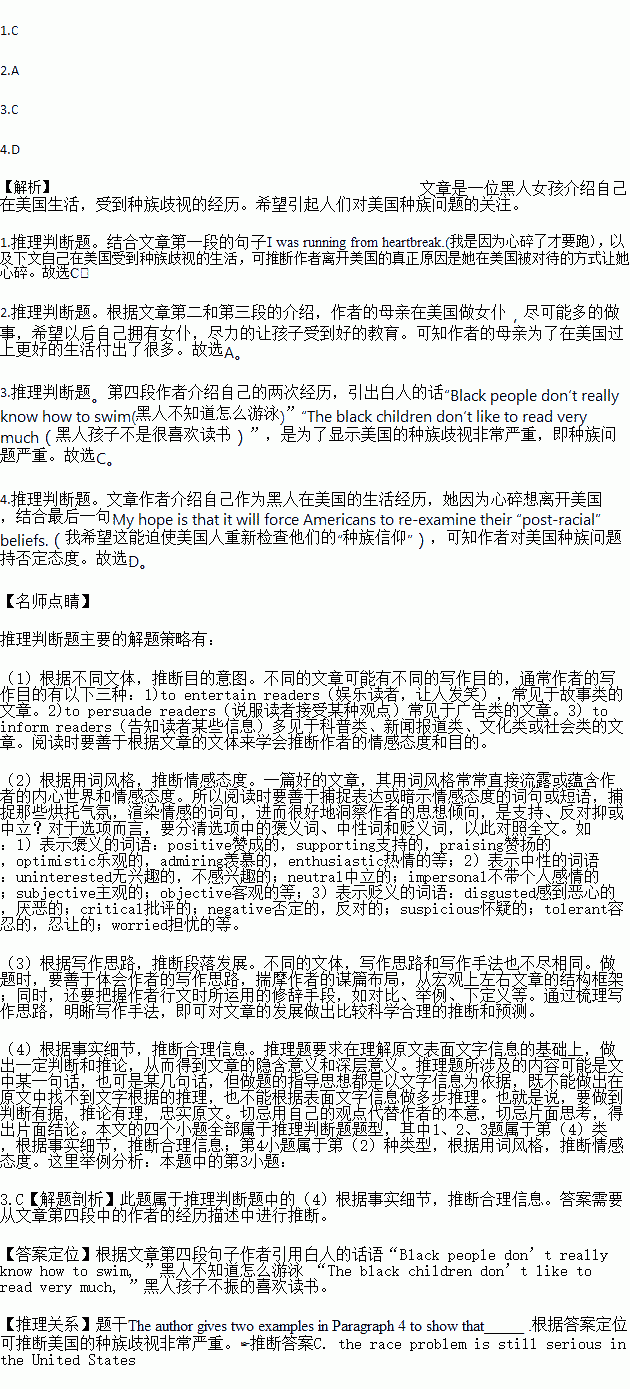题目内容
On the day of college graduation, I told my friends and family the news:I was leaving the country I had lived in since childhood. “I just need a change,”I told them, but there was more. I was running from heartbreak. My relationship with the United States is the toughest one I have ever had, as a country I loved and believed in did not love me back.
Back in the 90’s, my mother brought me from our home in the Caribbean islands to the U.S.when I was 4 years old. She worked as a live-in nanny(保姆)for two years, playing mommy for white kids whose parents had better things to do. She didn’t believe that nanny meant maid, and did whatever was asked of her. She was thirsty to embrace her American dream, hoping that her children would be educated and she might have nannies of her own.
Those were our path to get a “good education.”When the neighborhoods with quality schools became too expensive for my mom to afford as a single parent, we went across the United States with Great Schools. net as our compass: New Jersey, elementary school; Texas, middle school; Florida, high school; New York City, private university
For a long time I survived by covering myself in all kinds of labels so that people would ignore the color of my skin, yet I existed on the edge of ugly, ignorant and uncultured. “Black people don’t really know how to swim, “a white lady told me when I worked as a swim instructor at my neighborhood’s pool. “The black children don’t like to read very much, “I overheard one librarian discussing with another while l sat down reading a book a couple feet away.
I was never able to make America my home. When I stripped myself of the labels painfully one by one, beneath them there is a wounded colored woman who refuses to be faceless anymore. My face may be disgusting to some since it bears proof that race continues to be a problem. My hope is that it will force Americans to re-examine their “post-racial” beliefs.
1.What was the real reason that made the author leave the United States?
A. It couldn’t provide her with good education.
B. She just needed a challenge in her way of life.
C. The way she was treated there broke her heart.
D. She was tired of living in a strange country.
2.What can we infer about the author’s mother from Paragraphs 2 and 3 ?
A. She sacrificed a lot to live a better life in America.
B. She was quite content to work as a live-in nanny.
C. She was particular about the schools her daughter attended.
D. She liked visiting all kinds of schools with the author.
3.The author gives two examples in Paragraph 4 to show that_____ .
A. how ignorant and uncultured many people are in US
B. she needed to cover herself in all kinds of labels
C. the race problem is still serious in the United States
D. black children often have no interest in reading books
4.The author’s attitude towards the United States on race problem is_____ .
A. supportive
B. positive
C. neutral
D. negative

